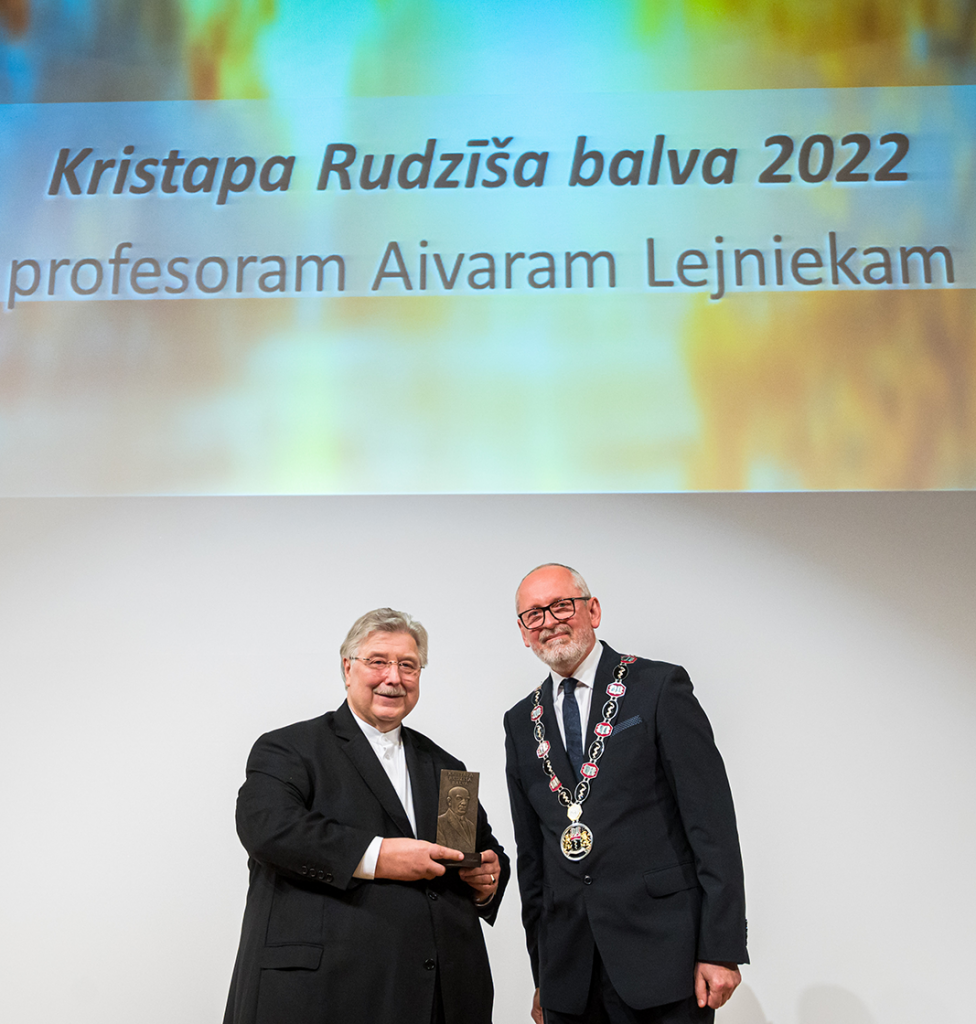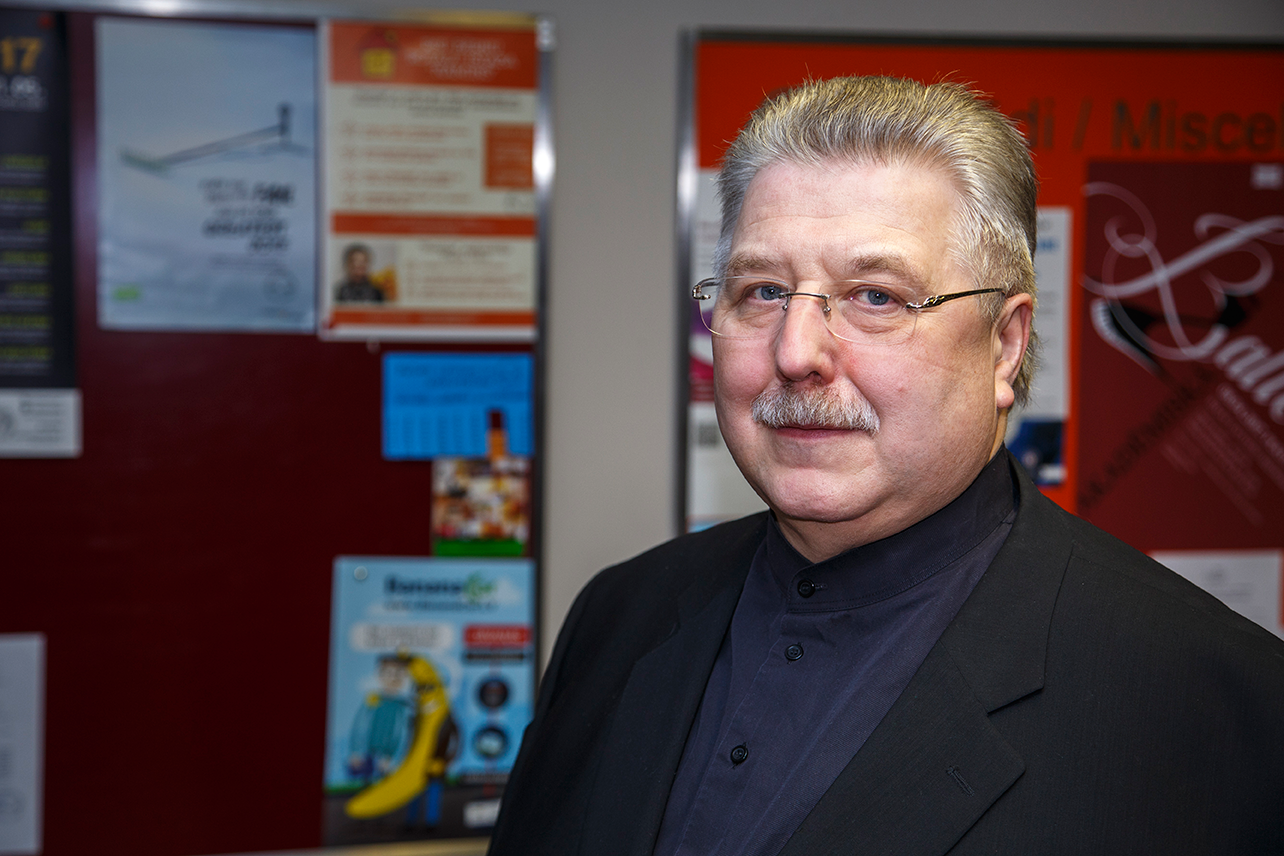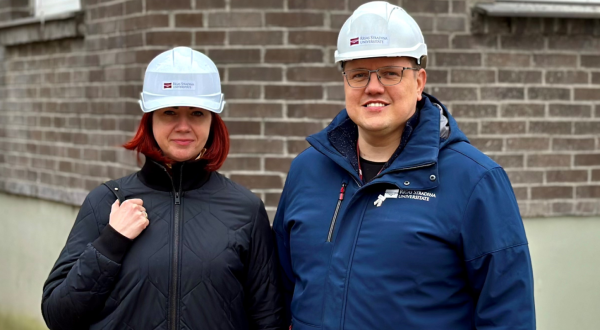Professor Aivars Lejnieks: My Principle in Life is to Keep Growing
Professor Aivars Lejnieks is the Head of the Department of Internal Diseases at Rīga Stradiņš University (RSU). He recently received the Kristaps Rudzītis Award for his outstanding and long-lasting contribution to the development of internal medicine. Kristaps Rudzītis was a doctor, professor and researcher. It is not possible to cover and describe Prof. Lejnieks’ extensive work in the clinic and at the university in a single interview, so this time we will talk about a number of events, evaluations, and opinions.

Prof. Aivars Lejnieks (left) at the Kristaps Rudzītis Awards ceremony with RSU Rector Prof. Aigars Pētersons
Sometimes young people know their future profession as early as the eighth or ninth grade and are determined to pursue it. Others, however, are still searching and doubting after high school. Did you know what you wanted to be at school?
I did not want to become a doctor when I was a child, as was the case in other well-known medical dynasties. At school, I was interested in both sports and entertainment. I liked economics, physics, history, and other subjects, but nothing very direct or specific. I played basketball and tennis, and I also received awards in sports.
I remember that in 11th and 12th grade I was fascinated by medical technology and electronics. At that time, you could only learn these subjects them in Leningrad [the former name of St Petersburg – Ed.]. In the USSR, there was a certain number of study places allocated for each republic. I would have gone there to study, but there were no places allocated to the Republic of Latvia that year. And of course, I had no desire to wait a year or more. I was ready to join the army because I did not want to apply to a programme that did not interest me just to avoid military service.
You started combining secondary school with work relatively early. What did you have to do?
In order to gain financial independence, I started working relatively early as a loader or builder, as well as doing various jobs related to fishing. During my school years, the TV competition Vai tu mīli jūru? (Do You Love the Sea?) was popular, and I was the captain of the Jūrmala Secondary School No. 4 team for several years. We competed and regularly won top spots, so I built a good relationship with the management of the Uzvara fishing collective farm. This gave me the opportunity to take part in the so-called shore brigades. I was also a cabin boy on a ship in the Baltic Sea one summer. All this happened in Jūrmala, the city where I was born, where I live now, and a city I will always be loyal to.
How did you end up at medical school?
One day in the summer of 1976, I finished work and decided to take a walk around the centre of Riga. My feet seemed to carry me to the Rīga Medical Institute (RMI). I remember that I had to submit six photographs along with other documents. Mine were not identical, like from a photo studio. Instead, I cut each of them out of a bigger photograph. I would like to thank Biruta Mamaja, now an associate professor, who was then the secretary in charge of the national admissions committee for accepting my different photographs!
I have to admit that my understanding of medicine was limited back then. I could not distinguish between general medicine and dentistry. I knew that pharmacy was something to do with chemistry. I had taken part in the chemistry and physics Olympiads, but I knew that I did not want to be a chemist.
A few days after submitting the documents, the admissions exams were held at the Anatomical Theatre. I managed to pass them quite successfully. I got the highest grades in physics and biology. I didn't receive a very good grade In Latvian language, however, because I was never good at grammar. At that time, acceptance letters were sent to students’ homes and I received a letter that I had been admitted to RMI and had to come in for an interview. The competition was tough back then – seven applicants to one place. I think that my good results in sports, which were appreciated at the institute, also helped. All in all, looking back on my choice of profession and the various doubts and coincidences that I have experienced, I can say that it has always been, and still is, as if someone from above was guiding my path.
How would you compare your studies at RMI then and at RSU today?
Back then, students had few sources of information. There were two - lectures and often hard-to-find books, which were mainly only in Russian. On the one hand, it was easier, as we didn't have to get lost in the labyrinth of sources. If you study a certain book, you know the subject. There were also books on medicine in English available in special shops, but the price for a book was equivalent to an engineer's monthly salary. In those days, we were given a certain number of books per group, which were not enough for everyone. We had to meet the library's strict deadlines, exchange books, or buy them for a lot of money.
Today, it is easier for students on the one hand, and more difficult on the other, because there are so many sources of information. The internet is inexhaustible and the RSU library is fantastic. Often you don't have to buy books at all, because you can find a lot of things online. However, it is more difficult to find information that is really necessary and not outdated. Today, a lot of responsibility rests with the lecturer. Sometimes students get confused because one book says one thing and another book says something slightly different, and medicine changes very fast these days. A statement that was true not long ago may be wrong today because of new research and discoveries.
I must also say that today's students have less respect for their lecturers. I am not saying that this is good or bad, but I remember that in my student years, when the lecture started and the lecturer entered the room, the students got up and greeted them. Today's students have become much more demanding, which is a good thing. However, demanding students fall into two groups: some are demanding because they really want to learn, while others are demanding in order to avoid doing something themselves by looking for a failure or mistake on the part of the lecturer.
My generation is lucky that today we have modern technology and that we have managed to learn and keep up. For those who were previously more inert to new technologies, the pandemic was an opportunity. For each of us individually and for the university as a whole, it led to rapid growth in digitalisation. RSU accomplished this by investing in IT infrastructure and in building the skills of the staff. When it comes to medical studies and digitalisation, my colleagues at the Medical Education Technology Centre (METC) have achieved admirable results in terms of training future doctors in a simulated environment. The team’s passion for what they do has allowed them to participate in NATO exercises and even to open an entire simulated operating theatre recently. These are things that I could not even read about in science fiction books when I was a student!
Young people see and appreciate this development, as the number of applications testifies to. The number of applicants has increased every year, with an increase of 111 % over the last five years. It is not only local applicants who appreciate the university – students from 65 countries are ready to trust us with their education. I also have international professors as colleagues, and their numbers have increased by 250 % over the last five years. In addition, we are establishing branches abroad – in Germany, Israel, and Italy. In short, RSU has become the most international university in the Baltics, and we can be proud of that.
What has given you the most fulfilment?
My principle in life is to keep moving forward and growing. To do this, I also always look back, searching for connections and causes. A lot of the credit for what I have achieved goes to my teachers. This time I will mention three outstanding people who have shaped my personality. At RMI, this was Gaidis Brežinskis, the founder of allergology in Latvia. He was a very good doctor/therapist, a highly intelligent person with a wide circle of acquaintances, including painters and singers. When I was twenty, he brought me into this intellectual environment.
For many years I worked with Asst. Prof. Agnis Štifts, who gave scientific insight to my work. At that time it was difficult to obtain foreign literature. Asst. Prof. Štifts had received an inheritance from a relative in the USA and he invested all his money in books. He had a wonderful library, and I had the opportunity to read these publications.
Thirdly, I would like to mention Kārlis Ēriks Ārons, a medical historian and therapist in his mentality. He was a long-standing director of the Museum of the History of Medicine with an encyclopaedic knowledge of history. He taught me to appreciate opera and classical music.
I have been very fortunate. When you help people, it gives you joy. However, I will always remember that this is thanks to my teachers.
Can you see whether a student has the potential to become a good doctor?
You have to be very careful about making negative decisions that can affect students' fate. Colleagues have called me to ask what to do about a student who has failed an exam several times asking whether they can continue their studies. I often answer that they should, and later I see that my advice was proven right. Students who were unlucky at some stage of their studies often turn out to be excellent and well-known physicians. They may not be therapists, but they work in other fields of medicine. If I had made a negative decision back then, they would not be physicians today. Lecturers and professors have to be very responsible in those moments when they have to make a negative decision. No matter how good and wise we are, we must remember that we are not God.
How do you evaluate your performance as a researcher?
Every doctor is a researcher and every patient is a research case. If we are able to summarise cases and draw conclusions, then this is already research. For me, it is the summarising or cognitive processes that are the most satisfying.
 For some researchers, the results are more important, but I prefer the process. Once you have the results, I relax and look for a new process. In endocrinology and in internal medicine in general, I study different risk factors that can negatively affect the process. I analyse risk factors in order to predict and prevent them. I have done this in the cardiovascular field as well as in the various metabolic fields. Examples include iodine research with Prof. Ilze Konrāde and other colleagues, or viral impact studies with Modra Murovska, a leading researcher at the Institute of Microbiology and Virology.
For some researchers, the results are more important, but I prefer the process. Once you have the results, I relax and look for a new process. In endocrinology and in internal medicine in general, I study different risk factors that can negatively affect the process. I analyse risk factors in order to predict and prevent them. I have done this in the cardiovascular field as well as in the various metabolic fields. Examples include iodine research with Prof. Ilze Konrāde and other colleagues, or viral impact studies with Modra Murovska, a leading researcher at the Institute of Microbiology and Virology.
There are fields where a researcher can work alone, but in medicine this is not possible – there is always a team, where everyone does their own work.
And what about the University's scientific achievements?
Over the past five years, the University has achieved very significant results in this area. Firstly, RSU has obtained the status of a research university. Secondly, the capacity for the internationalisation of research has increased significantly. Between 2017 and 2021, the number of high-quality publications has increased spectacularly from 179 to 445, or by 248 %. International external research grants have been attracted, the remuneration system for research and technical staff has been reformed, and research incentive schemes have been implemented. Investment in the research incentive system is growing year by year. In the spring we opened the Baltic Biomaterials Centre of Excellence with modern state-of-the-art research facilities. RSU is investing in the development of the pharmaceutical sector as well.
The biggest event in research at RSU is Research Week. You are one of its leaders. How do you evaluate its contribution so far and what can we expect from the next one that will take place in March?
Before Research Week, annual scientific conferences were held regularly at RSU for more than a decade. The format had exhausted itself, and Rector Prof. Pētersons, invited me to develop a new concept. This was the first Research Week in 2019, and next spring will be the third. The idea was not only to create an event for ourselves, but to attract Latvian medical practitioners, researchers, and, of course, well-known and established international scientists. Thanks to the Rector's and the administration's support, this international event was a fantastic success. The last conference in 2021 was held remotely due to the pandemic. It nevertheless attracted a record-breaking audience, both in terms of attendants and the countries they represented. Over the five conferences, more than 1,300 scientific papers were presented by researchers from 45 countries, virtually bringing together a total of 6,463 participants. The first RSU Research Week in 2019 attracted around 6,000 participants from 28 countries. 29 topics ranging from healthcare to communication science were covered, and this was a result of excellent teamwork.
And soon, in March next year, the third RSU Research Week will take place. It will bring together scientists, students, partners, government and non-governmental organisations, including diaspora organisations. Research Week 2023 will feature five international conferences, both online and in person, that will focus on healthcare and medical sciences as well as social sciences. I am looking forward to this event, which is an important event not only for the RSU calendar, but also for the local and even international researchers’ calendars.
Related news
 RSU is growing and developing: major reconstruction underway in the main buildingDevelopment, For RSU Employees, For Students
RSU is growing and developing: major reconstruction underway in the main buildingDevelopment, For RSU Employees, For Students


